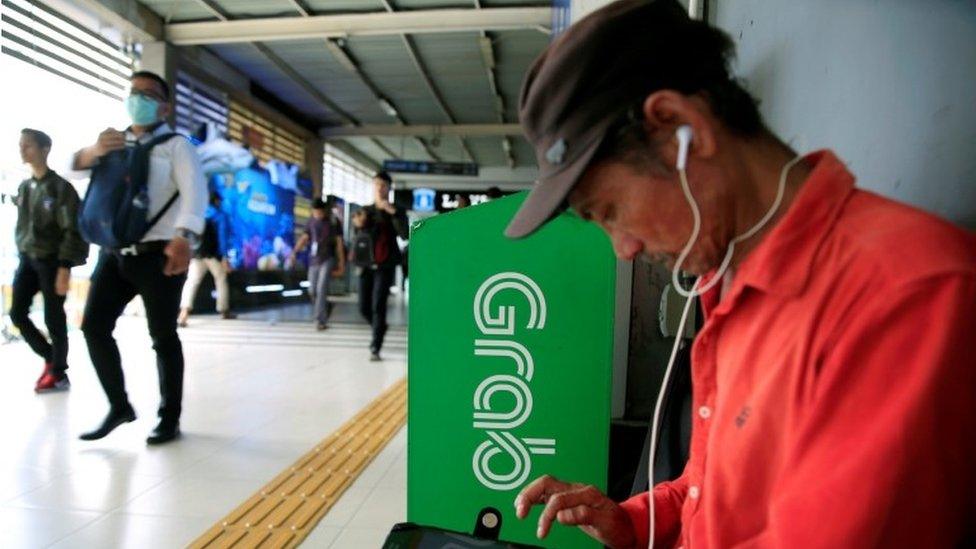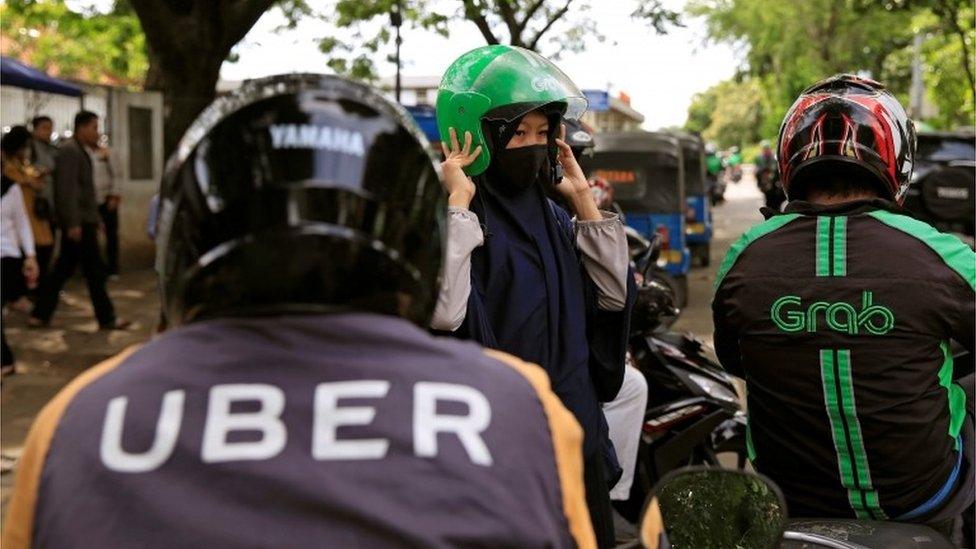Uber and Grab: When Goliath stands to lose every time
- Published
- comments

First China, then Russia, now South East Asia.
It is starting to sound like a familiar story.
Global taxi-hailing giant Uber enters a new market, with all the brashness and bravado of a bigger, more powerful invader, only to find itself waging a fierce battle on the streets with a home-grown rival, and then ultimately - losing the war.
We had the first inkling that Uber's global strategy of "barging in" was going awry when it lost the Chinese market to Didi Chuxing back in 2016.
At the time, as I wrote the explanation Uber gave for the China retreat was that it made sense for it to pull out of a market that was obviously so well served by Didi, and that it wasn't defeat when you end up with a stake in the company.
But remember, the then boss of Uber Travis Kalanick once famously said success in China meant being number one there, external.
Words he had to swallow evidently, especially as Uber was reportedly losing something like a billion dollars a year in China.
Bad news
Here, in South East Asia, emerges a similar tale.
Grab and Uber have been fighting to the death for market share on the mean streets of the region. It's not just the ride hailing business for cars that they're competing in - in countries like Indonesia, motorcycle taxi rides are big business too.
By some estimates, Uber has been losing hundreds of millions of dollars every year in South East Asia - along with its rivals.
All bad news for a company looking to go public in 2019.
"Uber is now under pressure to move towards making money for a 2019 IPO, which has been promised to shareholders," writes John Colley, of Warwick Business School. "In China, Russia and now South East Asia it has been out-flanked by local competition with better local knowledge and connections."
That local competition in South East Asia has come in the form of Malaysian business tycoon Anthony Tan. He's not your usual startup kind of guy, hailing from a family business with a well established network to tap into.
Having grown up in the region he understands the different and diverse nature of South East Asian markets.
Motorbike passengers - or Ojek passengers - in Jakarta for instance, are quite different from taxi-hailing Singaporeans. Customers in Bangkok have starkly differing travelling needs to commuters in Kuala Lumpur. Mr Tan says being based in South East Asia gives him the advantage in solving regional problems.

Mr Tan has also got bigger plans for the young startup, a company that has also managed to attract investment from the likes of Japan's Softbank, which also owns 15% of Uber.
In Singapore last month, the young and ambitious boss of what has now effectively become South East Asia's most powerful ride hailing app, told me how he wants Grab to be everything to everyone - across this market of 600 million people.
"We want to be that app that allows you to buy your coffee, earn rewards, then after that you want to buy your lunch and… have your food delivered so you don't have to go through the traffic jam," he said.
"When you're that relevant, that real to every customer across the 600 million base, then you create huge value."
Soul searching
But Mr Tan can't afford to be complacent. Even though he's managed to push Uber out of this market, he's got a hungrier, leaner upstart to face in the form Go-Jek, Indonesia's Google and Temasek-backed ride hailing app.
Right now, it's stuck to home ground, but there are rumours that it might head to the Philippines shortly.
For Uber though, there's sure to be some soul searching ahead.
This is the third market it's pulled out of in the last couple of years. The company has been keen to stress that this deal with Grab is a merger of equals - a partnership of sorts.
But the internal email from Uber's boss Dara Khosrowshahi, external reveals just how much of a detour the firm may have made in its global strategy.
"One of the potential dangers, of our global strategy," he writes, "is that we take on too many battles across too many fronts with too many competitors."
Uber has been quick to stress that there is no more consolidation on the cards - in fact, Uber's chief says that's out of the question.
But in the Asian markets Uber is still operating in - Japan, South Korea, and India - it is facing local competition.
And if the experience it's had out on these streets with homegrown competitors is anything to go by, Uber may be in for a bumpy ride ahead.